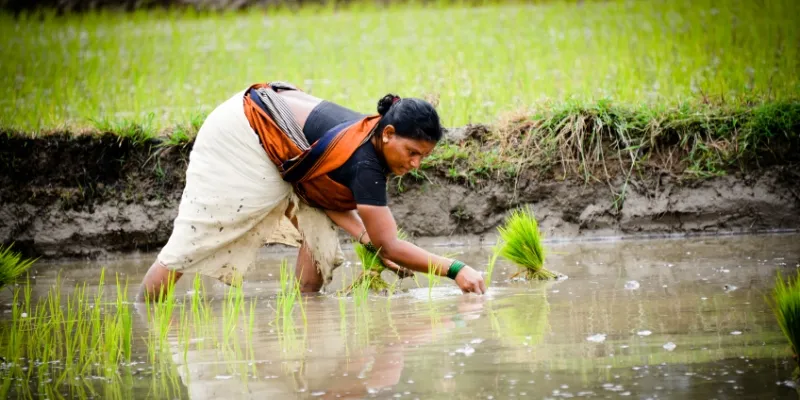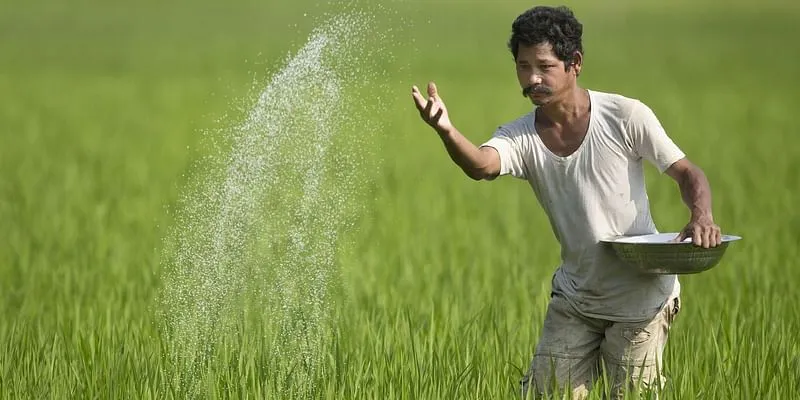Impact of COVID-19 on India's agritech sector and other key findings from an Accel-Omnivore study
The agritech sector gained tremendously from the lockdown and even after it. Here are the key findings from a joint study on India's post-pandemic agri landscape by Accel Partners and Omnivore.
Like all other industries, India's agriculture sector — the biggest contributor to the nation's GDP — was faced with huge uncertainties after the coronavirus outbreak.
Things worsened after the imposition of the nationwide lockdown on March 25.
Food supply chains froze, farmers struggled to purchase inputs right ahead of the harvest season, access to marketplaces and mandis was limited, agri-logistics and transport systems were broken, post-harvest loss mounted, and the cost of unsold produce pinched farmer finances. All in all, the sector was in complete disarray.
"Unable to conduct business for weeks on end, agricultural traders and SMEs were the worst hit," reveals a new report on India's post-COVID-19 agritech landscape.
A collaboration between Accel Partners and Omnivore (agritech-focused VC), the report indicates that despite the challenges faced by the agri sector, the "lockdown had the unintended consequence of accelerating the country's up-and-coming agritech ecosystem".
Almost all segments of agritech — farmer platforms, B2B agri marketplaces, rural fintech businesses, farm-to-consumer (F2C) brands, app-based agri advisories, and so on — witnessed impressive growth, triggered by the pandemic.
"Agritech startups, which for years had co-existed with the traditional ecosystem, suddenly discovered that they were essential. Ultimately, the pandemic helped catalyse a shift across the agricultural economy, away from traditional, informal, and analogue markets towards innovative, formal, and digital ones," the report explains.

India has 130 million farmers but only 20% of them are covered by agritech
Agritech startups stepped in to ease the lockdown-led bottlenecks. The solution to market agri-produce without travelling to aggregation spots like mandis and APMCs was found in online trade and e-mandis that helped farmers minimise their travel.
"The disrupted supply chains had to be reinstated with minimum loss of time and impact on farmers’ purse. A number of innovative business models began to fill the space on both the input and output side. Many of these revenue models were built on the power of digital technology," explains the report.
Ashok Dalwai, Chairman, Committee on Doubling of Farmers' Income (DFI), Ministry of Agriculture, Government of India, states,
"Even the government thought it proper to adopt the new norms of doing business at a universal scale. It comprises a new policy basket that liberalises agricultural trade, opts for aggregation platforms and farmer mobilisation, and aims at strengthening agri-logistics."
"There now exists a renewed scope for seamless direct trade between the farmers and agri-stakeholders such as traders, processors, and exporters. The supply chains will be enriched with new class of purchasers and disintermediation," he adds.
YourStory lists the key findings from Accel-Omnivore's report. These trends defined India's post-pandemic agritech landscape and are also likely to shape its future.

Agritech funding in India has grown 9.4X in the last five years
Growth in demand across the value chain
About 85 percent of agritech startups across the value chain recorded a "considerable" spike in demand for their products and services during the lockdown. As a result, 51 percent of these companies expect to see "positive sales growth for the year".
Horticulture, farm finance, and aquaculture recorded maximum growth of 80 percent, 71 percent, and 70 percent, respectively.
These were followed by farm machinery (69 percent), dairy (67 percent), crop advisory (65 percent), post-harvest services (63 percent), and agri inputs (62 percent).
Accel's Founding Partner Prashanth Prakash and Omnivore's Managing Partner Mark Kahn, jointly stated in the report,
"The increase in demand translates to optimism around fundraising as well, with 60 percent of the startups surveyed confident about seeing a surge in investment activity in the next six to 12 months. We expect the strong momentum in agritech to sustain as the demand for reliable food supply and quality produce increases."

Source: Accel-Omnivore report
Rise of B2B platforms and farmer marketplaces
The pandemic caused disruptions across the agri-supply chain, led to the shutdown of markets, and halted procurement and other on-ground operations.
B2B farmer platforms and agri marketplaces like , , , Aquaconnect, etc. that had already achieved rapid scale in the past few years, stepped in to fill the void, and continued to see high engagement even post the lockdown.
These platforms seamlessly connected all stakeholders digitally after the breakdown of traditional supply chains. Farmers’ requirement for inputs and crop-related advice and procurement needs of retailers and agri businesses led to a "sharp uptick in demand" for such agritech startups.
Ninjacart, for instance, was back to pre-COVID revenue levels in less than four weeks post-lockdown, and is seeing strong growth momentum on adoption.
Crop advisory startups, on the other hand, have recorded an 18X increase in app installs between March and November, as per the report.

e-mandis gained ground in the lockdown following the closure of physical marketplaces
Emergence of farm-to-consumer (F2C) brands
Indian consumers have never been as conscious about food safety as now.
Their increased health awareness has led to a high demand for fresh food brands and safe and traceable products. As a result, vertically integrated, end-to-end farm-to-home (or farm-to-consumer) platforms are gaining ground.
Accel-Omnivore explained in the report, "With people shifting to online ordering due to the lockdown, this could prove to be a watershed moment for F2C brands as they look to disrupt traditional distribution channels. Technology is a key lever through which F2C brands were able to maintain safe and reliable delivery of the produce. There was a shift in distribution channels from retail to consumer doorstep delivery."
The demand surge and push towards traceability was seen across categories, ranging from fresh fruits and vegetables to meat, seafood, and dairy. F2C brands like , Clover Ventures, , and that managed their supply chain, down to the last mile, in-house, gained significantly.
Some of these F2C startups also recorded 10X reduction in their customer acquisition costs and 2.5-3X growth in volumes during COVID-19.

F2C brands gained across categories from fresh fruits and vegetables to meat and seafood | Photo: INI Farms
Increased adoption of precision agriculture
The rising penetration of smartphones and the availability of low-cost data in India had been making farmers increasingly tech-savvy over the last few years. Despite that India continues to be heavily reliant on manual labour for farming activities.
However, the COVID-19 outbreak and the consequent migration of labour from various regions expedited farmers' adoption of agri-technology and app-based crop advisory services, and also warmed them up to farm mechanisation.
As a result, several agritech startups that were already looking to automate data collection and digitise farm operations got a significant boost. "Companies like Cropin witnessed a spike in demand for remote monitoring solutions by BFSI companies, while others like and Eruvaka found increasing buyers among the farming community for their hardware solutions," as per the report.
Cropin, which remotely collects farm level data for agribusinesses and farm financiers, recorded a 128 percent growth in leads and a 37 percent increase in deals closed online. Fasal, on the other hand, recorded a 38 percent growth in demand for its crop-specific data from regions where it had no presence before the pandemic.
"When businesses could not send field agents to farms to get regular updates on production data, they started looking for solutions that would allow farm-level monitoring without manual interventions," Accel-Omnivore explained.

Remote farm monitoring startups stepped up in the absence of field agents
Digitisation of agri-markets
The pandemic turned out to be a boon for startups that work towards improving market linkages between farmers, traders, and buyers. Not only did existing startups — , x, , — gain from the lockdown, but new service providers also emerged to accelerate the digitisation of agri-markets.
"Be it connecting farmers directly to buyers (like Ninjacart) or traders to buyers (like ), we are seeing new models emerge where output sale is no longer limited by the reach of mandis," the report stated.
Infrastructure needed for the creation of e-markets is also gaining momentum.
Startups like Samunnati and Arya are ramping up warehousing capacity at the farm gate and preventing the distress sale of crops, thereby improving farmer incomes. Other SaaS-based agri startups like Intello Labs and Agricx are ensuring better price discovery and helping companies grade quality of produce through visual images.
Arya, meanwhile recorded a 22 percent spike in warehouse usage by farmers.
Stellaps, on the other hand, witnessed a 5X growth in demand for its IoT-based dairy solutions that "optimise the dairy supply chain and drives significant value for farmers by improving farm economics, animal productivity, and enabling traceability".
Summing up the untapped opportunity in this segment, Accel-Omnivore said, "The current health crisis and the resultant lockdown have given a big impetus to the post-harvest management technology services. Further, the recent announcement of the amendments to Essential Commodity Act and the APMC Act would attract significant capital and private investment in the agriculture infrastructure."
Well, India's agritech revolution is only getting started.
Edited by Teja Lele





1564671114666.png?fm=png&auto=format&h=100&w=100&crop=entropy&fit=crop)







